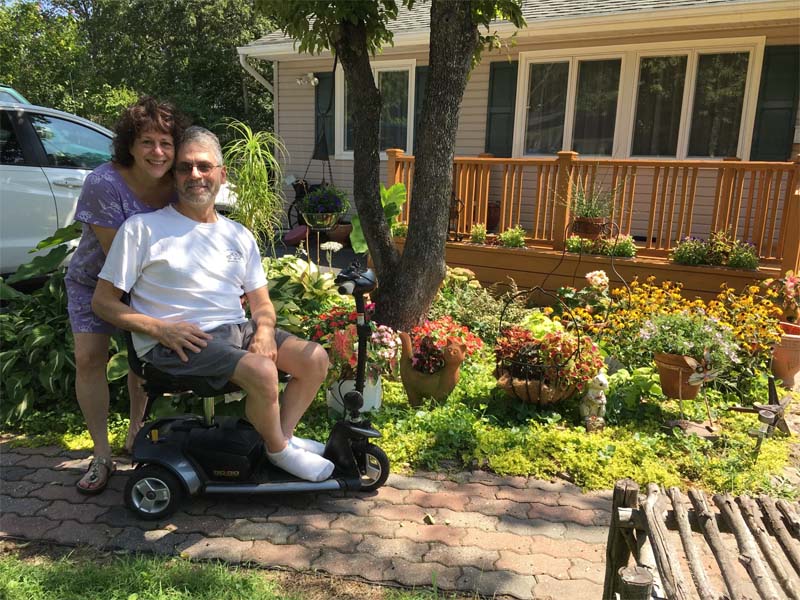Living Pain-free After Trigeminal Neuralgia

March 02, 2021
For Bernie Seyfert, a 64-year-old semi-retired plumber from Bayville, New Jersey, perseverance is a way of life. At age 36, he was diagnosed with multiple sclerosis (MS), a chronic disease that affects the protective covering of nerves and can cause many debilitating issues.
“When I was diagnosed with MS, I decided that I’m not going to die from it,” Bernie says. “I’m a pretty positive person. I’m a farm boy from Pennsylvania from a family of 16, and we would always deal with things as they come.”
With that approach, Bernie managed his MS for years. However, about 10 years ago, he started to feel intermittent extreme pain in his face and head. “It would come and go,” he says. “It was hell when it came and delightful when it left. That’s how it was for nine or 10 years, and then in the last two years, it got progressively worse.”
The pain got to the point that Bernie was experiencing it most of the time. It prevented him from doing a multitude of simple daily tasks: showering, shaving, eating, talking and more. “I couldn’t move my face, smile or talk,” he explains. “I’m a licensed plumber, and I’ve had an electric shock before. I would describe this pain as taking a live wire, pulling back the insulation and biting on it. It is the most severe, ungodly pain I’ve ever had.”
CyberKnife: the Cutting Edge
Bernie’s neurologist recommended the CyberKnife procedure for a condition called trigeminal neuralgia (TN).
“TN is a difficult diagnosis to make because you have to rule everything else out first,” says Priti S. Patel, M.D., radiation oncologist at Riverview Medical Center. “Even through a brain MRI, you usually don’t see an abnormality.”
TN is caused by a disruption to the normal function of the trigeminal nerve, often when a blood vessel is coming into contact with the nerve. This pressure can cause the nerve to malfunction, causing intense pain triggered by the lightest touch—even a strong gust of wind can start a TN episode. Because the extreme pain associated with it can cause suicidal ideation, it is sometimes referred to as the “suicide disease.”
Traditionally, TN can be treated with medication or through a surgical procedure that involves going inside the patient’s skull. However, Dr. Patel and neurosurgeon Bruce Rosenblum, M.D., have been treating this condition successfully with a cutting-edge technology called CyberKnife, which uses a robot to deliver X-ray beams with sub-millimeter accuracy to target the trigeminal nerve.
Compared to traditional surgery, Dr. Rosenblum says, CyberKnife offers several advantages:
- It’s painless for the patient.
- Anesthesia isn’t needed.
- There is no recovery time.
- It is non-invasive.
- It is a curative procedure rather than one meant to manage pain.
“Dr. Rosenblum and I work together with the physics team, and we outline the nerve and the surrounding critical structures to create an intricate treatment plan,” says Dr. Patel. “We aim 70–100 pencil-thin X-rays that all converge on one spot.”
Living Pain-Free
Dr. Patel estimates that about 80–90 percent of patients who receive the CyberKnife for TN receive at least some sort of pain relief from the procedure. (Neurosurgery. 2018 Nov 1;83(5):1023-1030.) For Bernie, this proved more than true. His procedure occurred on Oct. 21, 2019, and there was a good omen from the start.
“They asked me what kind of music I wanted to listen to during the procedure, and I asked for classic rock,” Bernie says. “I’ll never forget: It was ‘Tiny Dancer’ by Elton John, one of my favorite songs, and that was a sign.”
Bernie started to feel relief about two months after the procedure. “One morning in January, I was eating breakfast and feeling some pain, but not as severe as usual. I took the spoon and tried to eat with it and it hurt a little, but then—like someone hit a light switch—a wave of pain went out of my head and it was gone like a miracle,” he says.
Being able to talk again with his girlfriend, family and friends was one of the most important changes for Bernie after his pain went away. “I love to talk, and I’ve had so many years of talk trapped in my head,” he says. “When I went to a checkup after the pain went away, I realized I had never actually talked to anyone there. I’ll never forget going in and saying, ‘You’ve never heard me talk or laugh, and this is what it sounds like.’”
In the ensuing months, Bernie has remained pain-free and grateful for it. He can enjoy the simple pleasures in life again, like his girlfriend’s cooking or even a double-cheese pizza.
“Everything that has a temperature or chemical bothers the nerve. I used to have to grind up my pizza,” he says. “I always said to myself, ‘If this goes away, the first thing I’m doing is eating a large double-cheese pizza.’ And that Friday when my pain went away, that was exactly what I did.”
The Future Is Now
Bernie’s story sets the stage for a future where more patients can take advantage of this life-changing technology.
“CyberKnife represents a melding of ‘space-age’ technologies—robotics plus imaging plus guidance,” Dr. Rosenblum says. “Using scans to guide a robot to deliver finely focused X-ray beams is something out of science fiction, and now it’s becoming a standard treatment for us that is extremely effective.”
Next Steps & Resources:
- Meet our sources: Bruce Rosenblum, M.D. and Priti S. Patel, M.D. To make an appointment with Dr. Rosenblum, Dr. Patel or another doctor near you, call 800-822-8905 or visit our website.
- Learn more about Hackensack Meridian Health’s complete lineup of neuroscience services.
The material provided through HealthU is intended to be used as general information only and should not replace the advice of your physician. Always consult your physician for individual care.
Find a doctor near me
The Future of Surgery: Virtual Reality

JFK University Medical Center uses virtual reality for neurosurgery. Learn how VR improves surgery planning and patient understanding. Call 800-822-8905.
Jersey City Toddler Plagued by Seizures Is Now Seizure-free

Jersey City toddler's seizures stopped. Learn how doctors at Joseph M. Sanzari Children's Hospital helped Shanaya become seizure-free. Find hope & expert care.
Find a doctor near me
Toms River Osteoporosis Patient Receives Spine-saving Surgery
Toms River spine surgery success story. Dr. Tawfik helped Stephanie walk again after a severe osteoporosis-related injury. Learn more.
Colts Neck Couple Gives Back in Big—and Personal—Ways
Colts Neck couple's generous gift supports Jersey Shore University Medical Center's Neuroscience Institute. Learn how you can help.

Embracing Hope in the Midst of a Brain Tumor
Brain tumor? Find hope & expert care. Dana's story and Southern Ocean Medical Center's team offer support. Learn more.

Seeing Clearly
Overcome vision problems? Learn how surgery helped Richard regain his sight at Riverview Medical Center. Read his story.
